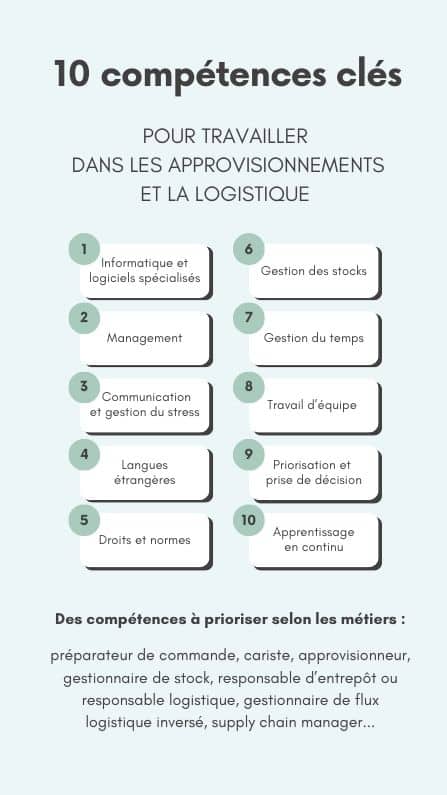Procurement and logistics play a key role role strategic role in business performance. But what are the essential skills needed to succeed in these fast-changing professions? From mastery of technology and efficient management of workflows to great adaptability, find out how to stand out from the crowd and progress in your career.

Procurement and logistics: strategic activities
Procurement manages the acquisition of goods, services and raw materials necessary for the operation of the company and the production of its products or services. It thus contributes directly to company competitiveness cost optimisation, risk reduction and business continuity.
Procurement: key missions
- Identify internal requirements: quantities and specifications.
- Searching for and selecting suppliers capable of meeting requirements in terms of quality, cost, lead times and commercial terms.
- Negotiating and contracting with suppliers: guaranteeing optimum terms and conditions, fostering long-term relationships.
- Managing orders and deliveries: planning and monitoring supply flows to ensure that resources are available at the right time and in the right place.
- Assess supplier performance: quality of products delivered and reliability of partners.
[Note] Procurement may include, but is not limited to, the purchasing function. The purchasing function may be the responsibility of a dedicated department.
[Also read]
Before the transport stage, logistics comes into play from receipt to dispatch products. The objectives: efficient logistics that meet customer expectations, while controlling costs and resources. The activity may be internal to the company, particularly in sectors such as food processing, automotive, pharmaceuticals, etc., or carried out on the company's behalf by one of the many companies specialising in logistics services.
Logistics (excluding transport): key missions
- Receiving and checking goods: checking the conformity of products received (quantity, quality, condition), recording them in the logistics system for accurate tracking.
- Managing stocks: optimising locations according to product rotation (high or low demand products), controlling stock levels to avoid shortages or surpluses.
- Preparing orders: selecting (picking), then wrapping and packaging products.
- Managing returns (reverse logistics): repairing, recycling or restocking returned products, optimising return processes to reduce costs and lead times (customer satisfaction).
- Track and analyse data: monitor stocks and flows in real time (digital tools), analyse performance to improve logistics processes.
[Note] Logistics also concerns companies that sell services. In this case, its role is often less visible. It mainly manages information flows and the resources needed to provide services, and sometimes the goods that accompany these services.
Changes in the skills required in procurement and logistics activities
Today's supply function operates in an unstable environment. There is a succession of crises: health, geopolitical, energy and climate. Shortages, stock-outs, longer delivery times... all highlight the strategic role played by procurement officers in maintaining a company's competitive edge. Knowing how to manage priorities and emergencies remains an essential part of the job. But it is above all the ability to adapt to increasing digitalisation of the supply chain. Supply must evolve to be more agile and data-driven.
In terms of logistics, there are many challenges. Firstly, theincreasing customer demandsFirstly, there is the diversification of the issues to be managed, the management of small quantities of goods with the growth of e-commerce, heightened expectations in terms of reliability (deadlines, integrity of goods, quality of customer relations, etc.) and service monitoring (real-time visibility, in particular). Secondly, the cost reduction. Finally, the new technologies are playing an increasingly important role: robots to move pallets, integrated management software packages, geolocation systems, QR codes, radio frequency identification (RFID), etc. They are as much a response to the issues at stake as a new challenge to be met. All this implies a skills development of the workforce in terms of technology, business skills and soft skills.
People skills are the third challenge facing logistics companies.
OPCO Mobilités, prospective study 2022
Procurement and logistics: 10 key skills
In the "procurement and logistics" function, a wide range of professions Logistics managers, supply chain managers, procurement officers, stock managers, reverse logistics flow managers, order pickers, forklift truck operators... So what are the key skills that you need to acquire or strengthen in order to perform better, become more versatile, adapt to changes in your business ? Only to end up with more career development prospects...
1/ IT and specialised software
Who are you? Developers, logistics IT specialists, logistics information systems managers, even data scientists. Depending on the context, the company may recruit specialised profiles or encourage internal skills development.
Why is this? Digital tools (ERP, WMS, TMS) are essential for optimising flow and data management.
Which courses? Training and certification in software development (SAP, Oracle, etc.) and database management (SQL) or specialised courses in data analytics/logistics.
What are the results? Improved productivity, accuracy of operations and strategic decision-making. Reduced data entry errors.

[Supply and logistics]
Testimony of Sophie, logistics manager in an industrial SME
In my opinion, a good manager knows how to spot hidden talent in his team and give them the opportunity to express themselves. That's what happened with Axel, one of our 25-year-old order pickers. I first noticed that he had a genuine interest in IT. When a technical problem arose, he didn't hesitate to come up with ideas and seemed to master concepts that go well beyond what is expected in your job. Then I discovered that he had a grounding in IT development without ever having had the opportunity to put it into practice in a professional context.
Our logistics platform needed to update its IT tool, a software package developed in-house. Our development teams were overloaded, it was a great opportunity for Axel to improve his skills. He received training in programming, as well as an introduction to the concepts of logistics systems management. Then, while working with the developers, his hands-on approach was a major asset He had a perfect understanding of our users' needs, which enabled us to adjust the software to make it more intuitive and better suited to our business.
The results are very positive. For Axel, first of all. He feels much more involved in the company and will continue to train to join the development team. Secondly, for the company. The tool is now more efficient, which has reduces order processing errors by 20 % and improved preparation times.
2/ Management
Who is it for? Logistics manager, procurement manager, supply chain project manager...
Why should you do this? Managers and team leaders coordinate complex projects (new tools, flow optimisation).
What training courses?
Project management: Agile and lean methods improve adherence to deadlines and the achievement of objectives.
Leadership: The leader provides a clear vision that unites and motivates teams.
What are the results? Increased team involvement, meeting deadlines and achieving objectives.
[Also read]
3/ Interpersonal communication and stress management
Who are you? Order picker, warehouse manager, flow manager...
Why is this? These functions involve constant interaction and high reactivity under pressure.
Which courses? Assertiveness, stress management, mediation techniques.
What are the results? Improved collaboration, fewer conflicts, better management of unforeseen events.
[Supply and logistics]
Testimony of Jérôme, warehouse manager
I'm in charge of a logistics warehouse with 50 employees, mainly forklift truck drivers and order pickers. For a long time, managing the teams was stressful for me. Tensions were frequent, with misunderstandings between colleaguesand misunderstood instructions and sometimes conflicts that slowed down business. One day, an argument between two colleagues almost got out of hand when I was unable to defuse the situation. I realised that my way of communicating, which was often directive, wasn't helping to calm things down.
To get things back on track, I followed a number of training in interpersonal communication and conflict management. I learnt to listen actively, to rephrase to make sure my message was understood and to manage my emotions, especially in tense moments. I was also given the keys to engage in more constructive dialogue with my teamsIn particular, by recognising their efforts and giving them more space to express their ideas.
Since then, the working atmosphere has improved and conflicts have decreased. I now know how to manage disagreements and other quarrels to avoid escalation. My colleagues tell me that they feel taken into consideration. As for me, I've gained in serenity: I no longer go home with this weight on my shoulders. And that's not just about the atmosphere, the results are in: the error rate has fallen by 15 % and we're better at meeting deadlines because our teams are more cohesive and motivated.
This experience has taught me that good communication is just as important as mastering the technical aspects of the business. It's an essential skill that I continue to work on every day.
4/ Foreign languages
Who are you? International buyers, procurement officers, import/export managers...
Why do we need to do this? The globalisation of supply chains requires communication with foreign partners.
What training courses? Professional English or another target language (Spanish, Mandarin, German).
What are the results? Improved negotiations, fewer misunderstandings.
5/ Legal knowledge, in-depth knowledge of the regulatory environment
Relevant professions: QHSE manager (quality, health, safety, environment), buyer, specialised logistician.
Why do we need to do this? Understanding the legal implications is crucial to avoiding disputes and ensuring compliance.
What training do you need? Basic knowledge of contract law and risk management, integrated QSE systems.
What are the results? Reduced legal risks, improved contractual relations and regulatory compliance.
6/ Inventory management techniques
Relevant occupations: warehouse manager, logistics technician, inventory manager.
Why should we do this? To maximise the efficiency of warehouse digitalisation.
What kind of training? WMS (warehouse management system) software, stock automation, RFID.
What are the results? Fewer management errors, improved processing times, productivity gains.
[Supply and logistics]
Testimony of Martin, Inventory Manager
I work in a warehouse which, for years, operated in a very traditional way: manual checks, Excel spreadsheets and basic scanners to keep track of stocks. I learnt the job on the job, without any specific training, and this method worked... until the company decided to modernise the warehouse with technologies such as RFID, process automation and even robots to manage certain tasks.
At first, I was at a loss because I didn't really understand these tools or their potential. I had fear of not being up to the job. Some colleagues were also suspicious, which added to the pressure. My role became twofold: I had to adapt quickly, but I also had to be able to adapt quickly. able to explain these new methods to my team.
So.., I have taken a training course on digital stock management. I learnt how to use RFID technologies for real-time tracking and how to configure the WMS to optimise storage. I also understood how warehouse robotics work. By drawing inspiration from the trainers' teaching methods, I was able to pass on these new skills to my colleagues.
The results are impressive. Today, we save an incredible amount of time thanks to RFID: stock control that used to take days to complete can now be done in a matter of hours. Robotisation has reduced placement errors. My teams are more efficient because they know how to use these tools better. They have gained in confidence and are now committed to the project.
For my part, I've rediscovered a real serenity in my work. Not only have I mastered the new technologies, but I also feel that I've taken a decisive step towards my professional future. My adaptability has become my greatest strength.
7/ Rigour, precision and organisation: speed of execution and time management
Who are you? Order picker, logistics operator, flow manager.
Why is this? These jobs demand a high level of efficiency, often to tight deadlines.
What training courses? Personal organisation, priority managementtime management techniques.
What are the results? Faster completion of tasks, fewer errors, greater customer satisfaction.
8/ Ability to work in a team, self-control, reliability
Who: forklift operator, logistics agent, order picker.
Why is this? The success of logistics operations depends on excellent coordination and stress management.
What training courses? Team building, assertiveness, stress and emotion management.
What are the results? Better team cohesion, less tension, greater reliability in carrying out tasks.
9/ Problem-solving, prioritising, decision-making
Relevant professions: supply chain manager, logistics coordinator, crisis manager.
Why do we need to do this? Unforeseen events require rapid and effective solutions to limit the impact on operations.
What training courses? Agile methods, lean.
What are the results? Reduced downtime, optimised resources, better strategic decisions.
10/ Capacity for continuous learning: a taste for training
Professions concerned: all procurement and logistics professions.
Why do we need to do this? Rapidly evolving technologies and practices mean that skills need to be regularly updated.
What kind of training? MOOCs, sector-specific certifications, new technologies.
What are the results? Enhanced employability, adaptation to new trends, improved long-term performance.
Procurement and logistics: training for career development
[Training]
Managing and optimising supplies and stocks
Key points:
- optimising and streamlining supplies
- reduce the value of average stock
- improve the service rate
Example of practical work: calculation of an optimum average stock and a safety stock.
Participants speak out:
"Concrete examples help us to understand things better.
"I can't wait to apply these tried and tested methods.
"I think I'll be able to handle my job better afterwards.
[Training]
Optimising the supply chain and reducing logistics costs
Key points:
- reduce logistics costs
- effective management tools
Example of practical work: identification of costs based on an international flow scenario.
Participants speak out:
"Incredible experience that brings theory and practice together."
"A good mix of experience, concepts and examples of concrete solutions."
"A very interesting course, full of supply chain management methods and techniques.
[Training]
Key points:
- identify supply chain stakeholders and their interactions
- understand the techniques and methods used in logistics
- ensuring customer satisfaction
Example of practical work: planning and scheduling, setting up a monitoring dashboard.
Participants speak out:
"This course helped me to understand the logistics profession.
"A very rewarding course with a wealth of practical experience.
"The trainer answered questions with pedagogy and humour."





